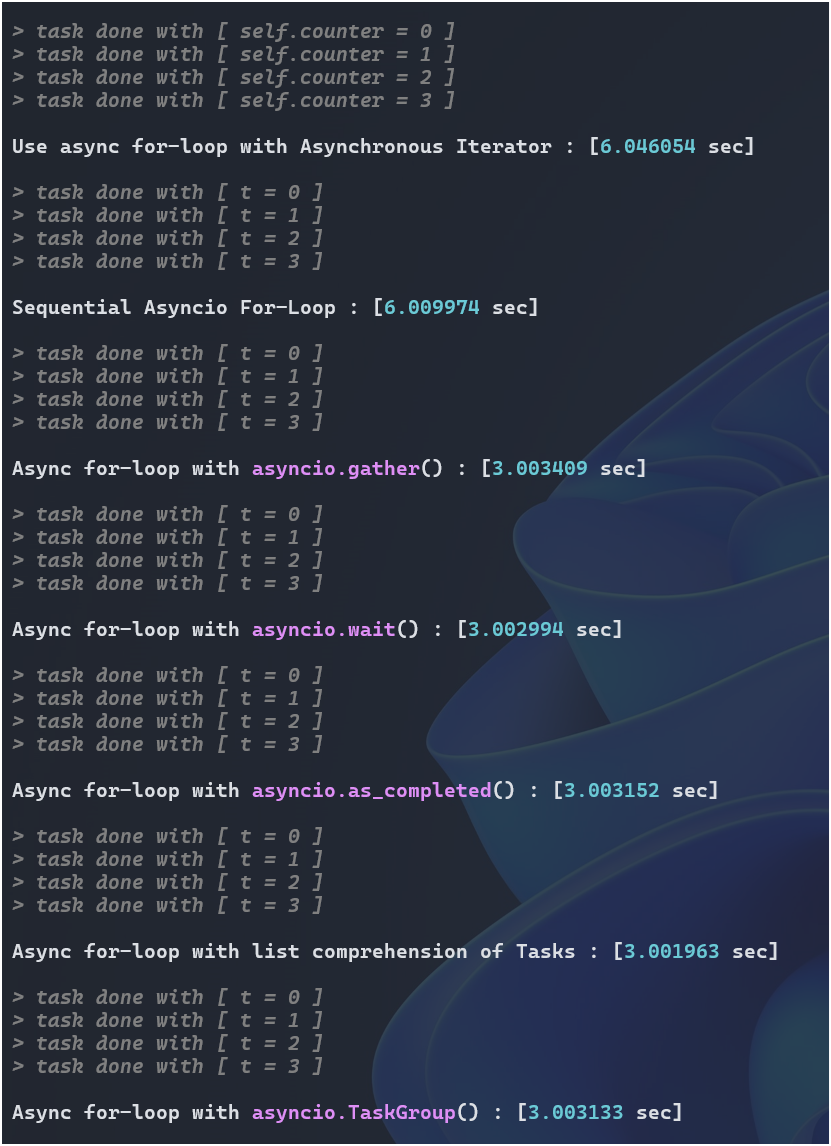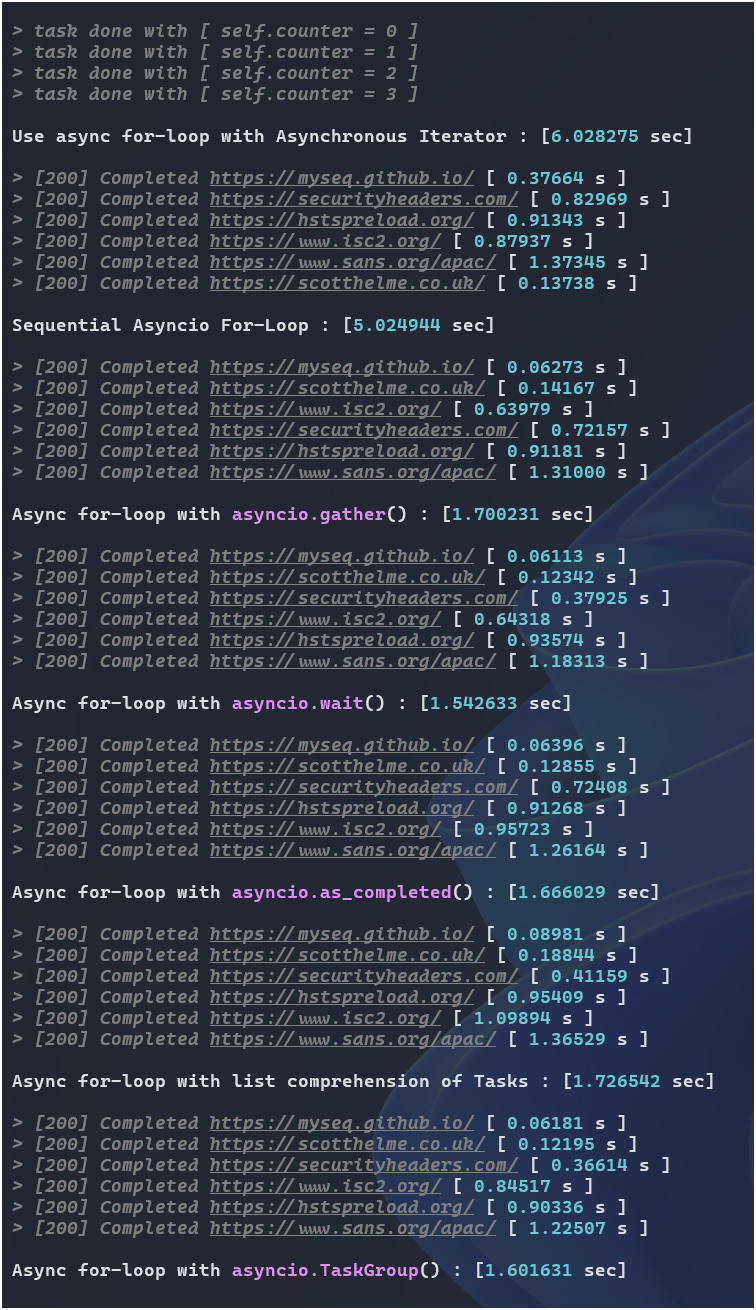Simply using async keyword doesn’t make your app work asynchronously.
Let’s practice AsyncIO with different models, including aiohttp for concurrent network connections.
In understanding AsyncIO by examples, we demonstrate 3 examples including aiohttp to perform concurrent HTTP connections.
There are multiple ways to use asyncio, and here I share a few models of using them.
- Async for-loop with asynchronous iterator
- Sequential async for-loop (Yes, using async wrongly may end up same as normal synchronous sequential)
- Async for-loop with asyncio.gather()
- Async for-loop with asyncio.wait()
- Async for-loop with asyncio.as_completed()
- Async for-loop with list comprehension
- Async for-loop with asyncio.TaskGroup()
AsyncIO Models#
The following code demonstrates 7 ways of using Async to do the same thing (sleep 4 diff times).

# AsyncIO models
import asyncio
from timeit import default_timer as timer
from rich import print as rprint
class CustomIterator():
def __init__(self):
self.counter = 0
def __aiter__(self):
return self
async def __anext__(self):
if self.counter >= 4:
raise StopAsyncIteration
await asyncio.sleep(self.counter)
rprint(f'[i][#808080]> task done with [ {self.counter = } ] [/#808080][/i]')
self.counter += 1
#return self.counter
# async task
async def work(t):
await asyncio.sleep(t)
rprint(f'[i][#808080]> task done with [ {t = } ] [/#808080][/i]')
# main coroutine
async def main():
print(f'')
s = timer()
async for w in CustomIterator():
...
e = timer()
rprint(f'\nUse async for-loop with Asynchronous Iterator : [{e-s:.6f} sec]\n')
s = timer()
for data in range(4):
await work(data)
e = timer()
rprint(f'\nSequential Asyncio For-Loop : [{e-s:.6f} sec]\n')
s = timer()
coros = [ work(t) for t in range(4) ]
await asyncio.gather(*coros)
e = timer()
rprint(f'\nAsync for-loop with asyncio.gather() : [{e-s:.6f} sec]\n')
s = timer()
tasks = [ asyncio.create_task(work(t)) for t in range(4) ]
_ = await asyncio.wait(tasks)
e = timer()
rprint(f'\nAsync for-loop with asyncio.wait() : [{e-s:.6f} sec]\n')
s = timer()
tasks = [ asyncio.create_task(work(t)) for t in range(4) ]
for task in asyncio.as_completed(tasks):
result = await task
e = timer()
rprint(f'\nAsync for-loop with asyncio.as_completed() : [{e-s:.6f} sec]\n')
s = timer()
tasks = [ asyncio.create_task(work(t)) for t in range(4) ]
for task in tasks:
result = await task
e = timer()
rprint(f'\nAsync for-loop with list comprehension of Tasks : [{e-s:.6f} sec]\n')
s = timer()
async with asyncio.TaskGroup() as group:
_ = [ group.create_task(work(t)) for t in range(4) ]
e = timer()
rprint(f'\nAsync for-loop with asyncio.TaskGroup() : [{e-s:.6f} sec]\n')
asyncio.run(main())
AsyncIO Practices#
Here, I practices the same way to perform 6 HTTP connections asynchronously by leveraging each model above.

# AsyncIO Practices
import aiohttp
import asyncio
from timeit import default_timer as timer
from rich import print as rprint
class CustomIterator():
def __init__(self):
self.counter = 0
def __aiter__(self):
return self
async def __anext__(self):
if self.counter >= 4:
raise StopAsyncIteration
await asyncio.sleep(self.counter)
rprint(f'[i][#808080]> task done with [ {self.counter = } ] [/#808080][/i]')
self.counter += 1
#return self.counter
# async task
async def work(t):
await asyncio.sleep(t)
rprint(f'[i][#808080]> task done with [ {t = } ] [/#808080][/i]')
async def fetch(client, url):
async with client.get(url) as resp:
await resp.text()
async def on_request_start(session, trace_config_ctx, params):
trace_config_ctx.start = asyncio.get_event_loop().time()
async def on_request_end(session, trace_config_ctx, params):
elapsed = asyncio.get_event_loop().time() - trace_config_ctx.start
rprint(f'[i][#808080]> [{params.response.status}] Completed {params.url}[/#808080][/i] [ {elapsed:.5f} s ]')
# main coroutine
async def main(urls):
print(f'')
trace_config = aiohttp.TraceConfig()
trace_config.on_request_start.append(on_request_start)
trace_config.on_request_end.append(on_request_end)
s = timer()
async for w in CustomIterator():
...
e = timer()
rprint(f'\nUse async for-loop with Asynchronous Iterator : [{e-s:.6f} sec]\n')
s = timer()
async with aiohttp.ClientSession(trace_configs=[trace_config]) as client:
for url in urls:
await fetch(client,url)
e = timer()
rprint(f'\nSequential Asyncio For-Loop : [{e-s:.6f} sec]\n')
s = timer()
async with aiohttp.ClientSession(trace_configs=[trace_config]) as client:
coros = [ fetch(client,url) for url in urls ]
await asyncio.gather(*coros)
e = timer()
rprint(f'\nAsync for-loop with asyncio.gather() : [{e-s:.6f} sec]\n')
s = timer()
async with aiohttp.ClientSession(trace_configs=[trace_config]) as client:
tasks = [ asyncio.create_task(fetch(client,url)) for url in urls ]
_ = await asyncio.wait(tasks)
e = timer()
rprint(f'\nAsync for-loop with asyncio.wait() : [{e-s:.6f} sec]\n')
s = timer()
async with aiohttp.ClientSession(trace_configs=[trace_config]) as client:
tasks = [ asyncio.create_task(fetch(client,url)) for url in urls ]
#for task in asyncio.as_completed(tasks):
# result = await task
results = [ await task for task in asyncio.as_completed(tasks) ]
e = timer()
rprint(f'\nAsync for-loop with asyncio.as_completed() : [{e-s:.6f} sec]\n')
s = timer()
async with aiohttp.ClientSession(trace_configs=[trace_config]) as client:
tasks = [ asyncio.create_task(fetch(client,url)) for url in urls ]
for task in tasks:
result = await task
e = timer()
rprint(f'\nAsync for-loop with list comprehension of Tasks : [{e-s:.6f} sec]\n')
s = timer()
async with aiohttp.ClientSession(trace_configs=[trace_config]) as client:
async with asyncio.TaskGroup() as group:
_ = [ group.create_task(fetch(client, url)) for url in urls ]
e = timer()
rprint(f'\nAsync for-loop with asyncio.TaskGroup() : [{e-s:.6f} sec]\n')
if __name__ == "__main__":
urls = [
'https://myseq.github.io/',
'https://securityheaders.com/',
'https://hstspreload.org/',
'https://www.isc2.org/',
'https://www.sans.org/',
'https://scotthelme.co.uk/'
]
asyncio.run(main(urls))
